November 29, 2018
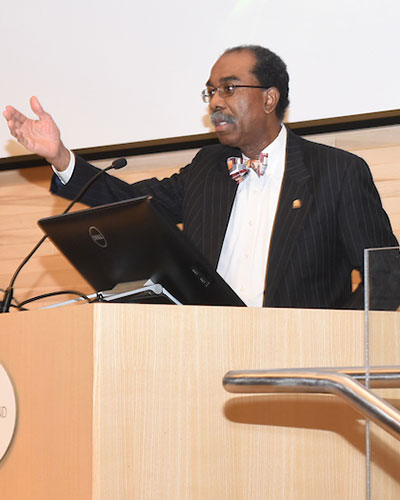
“We are constantly exploring and trying to learn more about who we are. There really is an innate curiosity that allows us to become better informed and proactively plan for potential health issues. Indeed, when we know more, we can do more.”
With these words, UMSOM Dean E. Albert Reece, MD, PhD, MBA, who is also the Executive Vice President for Medical Affairs, University of Maryland, and the John Z. and Akiko K. Bowers Distinguished Professor, kicked off the sixth annual Festival of Science on November 29, 2018. The daylong celebration of innovative research by UMSOM scientists, held in the school’s Leadership Hall, featured a series of nine faculty presentations focusing on the theme, “OMICS Biology: Basic, Translational, and Clinical Applications.” (The term “omics” refers to any field of biologic study ending in -omics, such as genomics.) Also in attendance was UMSOM’s external Scientific Advisory Council, composed of preeminent national scientists, which provides the school with big-picture advice on research. Council Members include Ralph Snyderman, MD (Chair) Chancellor Emeritus, Duke University, and the James B. Duke Professor of Medicine at the Duke University School of Medicine: Rita Colwell, PhD, Distinguished Professor, University of Maryland College Park and Former Director, National Science Foundation; Diane E. Griffin, MD, PhD, Professor & Chair, W. Harry Feinstone Department of Molecular Microbiology & Immunology, Johns Hopkins Bloomberg School of Public Health; George C. Hill, PhD, Past Levi Watkins, Jr. M.D. Professor for Diversity in Medical Education; Distinguished Professor Emeritus of Pathology, Microbiology & Immunology and of Medical Education & Administration; Former Vice Chancellor for Equity, Diversity and Inclusion, Vanderbilt University; and Gilbert Omenn, MD, PhD, Professor, Computational Medicine & Bioinformatics; Human Genetics; Molecular Medicine & Genetics; Public Health, School of Public Health; and Harold T. Shapiro Distinguished University Professor, University of Michigan.
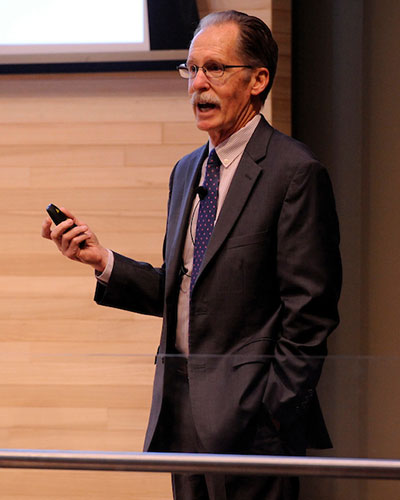 Launching the day’s agenda was the Festival’s keynote speaker, Huntington Willard, PhD, Director of Geisinger National Precision Health, Associate Chief Scientific Officer, and Howard Hughes Medical Institute Professor, who addressed the challenges of introducing genomics into medicine. “Part of the excitement in the field today is that we are at a moment in time when this slow increase in the pace of implementation and integration of genomics into the practice of medicine has become asymptotic,” he noted. “We will see many more advances in the coming decade than in the past two decades since the completion of the Human Genome Project. There will be a day when universal genomic sequencing is a routine part of public health as a screening tool to improve human health and wellbeing.”
Launching the day’s agenda was the Festival’s keynote speaker, Huntington Willard, PhD, Director of Geisinger National Precision Health, Associate Chief Scientific Officer, and Howard Hughes Medical Institute Professor, who addressed the challenges of introducing genomics into medicine. “Part of the excitement in the field today is that we are at a moment in time when this slow increase in the pace of implementation and integration of genomics into the practice of medicine has become asymptotic,” he noted. “We will see many more advances in the coming decade than in the past two decades since the completion of the Human Genome Project. There will be a day when universal genomic sequencing is a routine part of public health as a screening tool to improve human health and wellbeing.”
The capacity audience also heard from Claire M. Fraser, PhD, Dean's Endowed Professor and Director, Institute for Genome Sciences, who provided an in-depth overview of UMSOM’s broad spectrum of genomics research, from basic research discoveries to evidence-based translational medicine, spurred by the efforts of the school’s Institute for Genomic Sciences and the Program for Personalized and Genomic Medicine. “We always are looking for collaborative opportunities with all of the school’s academic departments,” she said. “As a result, our genomic research portfolio generated $36 million in funding last year and covers the entire phylogenetic tree.”
Other Festival presentation sessions included:
Session One: OMICS and Infectious Diseases
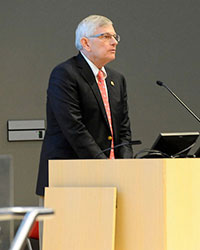 Moderator: Terry B. Rogers, PhD, Associate Dean for Research Development & Administration and Executive Director, Office of Research Affairs
Moderator: Terry B. Rogers, PhD, Associate Dean for Research Development & Administration and Executive Director, Office of Research Affairs
Dean’s Challenge Award Presentation: “Leveraging Parasite Population Genomics Data to Understand Malaria Vaccine Efficacy and Drug Resistance”
- Joana Carneiro da Silva, PhD, Associate Professor, Department of Microbiology & Immunology and Institute for Genome Sciences
- Kirsten Lyke, MD, Professor, Department of Medicine and Center for Vaccine Development and Global Health
- Shannon Takala Harrison, PhD, Associate Professor, Department of Medicine and Center for Vaccine Development and Global Health
“Genome-Guided Discovery of Novel Antifungal Therapies”
- Vincent Bruno, PhD, Associate Professor, Department of Microbiology & Immunology and Institute for Genome Sciences
Session Two: OMICS and Precision Medicine
Moderator: Curt Civin, MD, Professor, Department of Pediatrics; Director, Center for Stem Cell Biology & Regenerative Medicine; and Associate Dean for Research
“Discovering Sequence Variation in Human Genomes: Population Genetics, Human Diseases, and Clinical Genomics”
- Scott Devine, PhD, Associate Professor, Department of Medicine and Institute for Genome Sciences
“Genetics and Genomics of Diabetes”
- Toni Pollin, PhD, Associate Professor, Department of Medicine
Session Three: OMICS and the Microbiome
Moderator: Richard Eckert, PhD, John F. B. Weaver Professor and Chair, Department of Biochemistry & Molecular Biology, and Associate Director of Basic Science Research, University of Maryland Marlene and Stewart Greenbaum Comprehensive Cancer Center
“The Vaginal Microbiome in Health and Disease”
- Jacques Ravel, PhD, Professor, Department of Microbiology & Immunology, and Associate Director, Institute for Genome Sciences
“M’Omics: Maternal Stress Impacts on Brain Development”
- Tracy Bale, PhD, Professor, Department of Pharmacology
“Gut Microbiota, Innate and Adaptive Inflammation, and Host Immunity: A Ménage à Trois that Determines Transplant Outcome”
- Emmanuel Mongodin, PhD, Assistant Professor, Department of Microbiology & Immunology and Institute for Genome Sciences
- Jonathan Bromberg, MD, PhD, Professor and Vice Chair for Research, Department of Surgery, Center for Vascular & Inflammatory Diseases and Center for Stem Cell Biology & Regenerative Medicine
UMSOM’s Festival of Science is the cornerstone of the school’s special research initiative, Accel-Med, which embodies the research component of the Shared Vision 20/20 and aims to significantly increase the pace and scope of innovation and discovery, with the ultimate goal of improving human health and wellbeing.
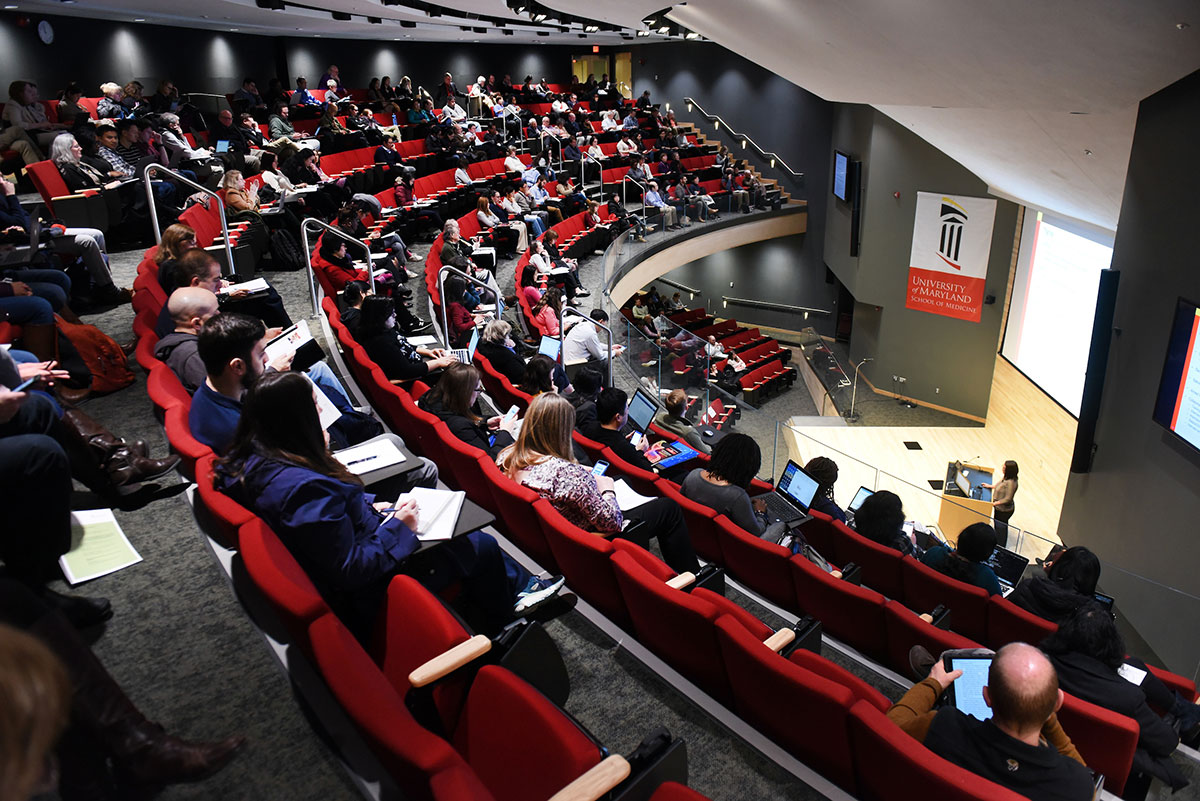
About the University of Maryland School of Medicine
Now in its third century, the University of Maryland School of Medicine was chartered in 1807 as the first public medical school in the United States. It continues today as one of the fastest growing, top-tier biomedical research enterprises in the world -- with 43 academic departments, centers, institutes, and programs; and a faculty of more than 3,000 physicians, scientists, and allied health professionals, including members of the National Academy of Medicine and the National Academy of Sciences, and a distinguished recipient of the Albert E. Lasker Award in Medical Research. With an operating budget of more than $1 billion, the School of Medicine works closely in partnership with the University of Maryland Medical Center and Medical System to provide research-intensive, academic and clinically-based care for more than 1.2 million patients each year. The School has over 2,500 students, residents, and fellows, and more than $530 million in extramural funding, with most of its academic departments highly ranked among all medical schools in the nation in research funding. As one of the seven professional schools that make up the University of Maryland, Baltimore campus, the School of Medicine has a total workforce of nearly 7,000 individuals. The combined School and Medical System (“University of Maryland Medicine”) has an annual budget of nearly $6 billion and an economic impact more than $15 billion on the state and local community. The School of Medicine faculty, which ranks as the 8th highest among public medical schools in research productivity, is an innovator in translational medicine, with 600 active patents and 24 start-up companies. The School works locally, nationally, and globally, with research and treatment facilities in 36 countries around the world. Visit medschool.umaryland.edu/
Contact
Office of Public Affairs
655 West Baltimore Street
Bressler Research Building 14-002
Baltimore, Maryland 21201-1559
Contact Media Relations
(410) 706-5260
Related stories
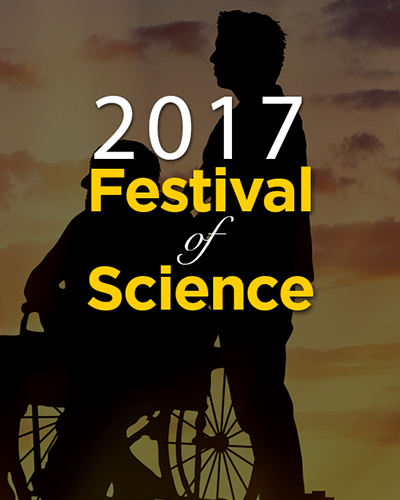
Friday, December 08, 2017
Internationally Recognized Researchers on Aging and Mobility Speak at the Fifth Annual Festival of Science
Leading scientists who study aging and mobility discussed their cutting-edge work at the fifth annual University of Maryland School of Medicine (UMSOM) Festival of Science, a one-day celebration of research at the school held December 14 in Leadership Hall.
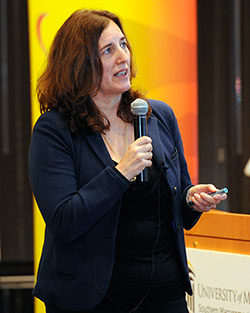
Thursday, November 10, 2016
Top Cancer Scientists Speak at the Fourth Annual Festival of Science
More than 500 people saw leading cancer scientists discuss their cutting-edge work at the fourth annual University of Maryland School of Medicine (UM SOM) Festival of Science, a one-day celebration of research at the school held November 10, 2016 the SMC Campus Center. The conference, titled “Cancer Research: Translational Discoveries to Next Generation Treatments,” featured a range of UM SOM’s top cancer researchers, who are working on the front lines of science to unravel crucial problems involving cancer in its many forms.
